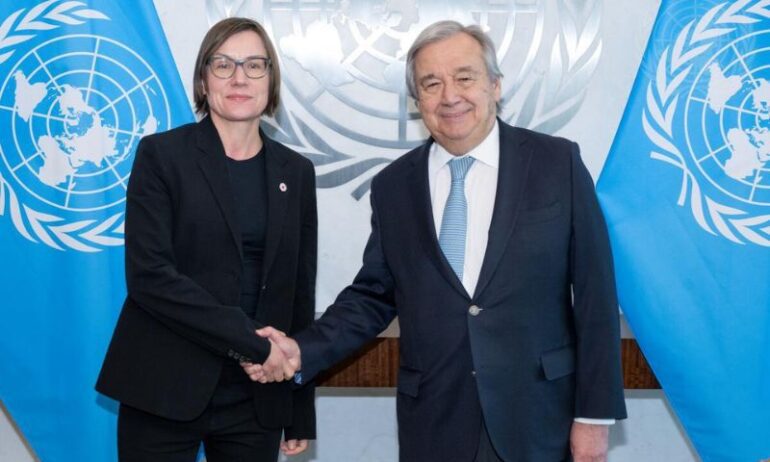TL;DR:
- The UN Secretary-General and ICRC President jointly appeal for international regulations on autonomous weapon systems.
- Autonomous weapons pose humanitarian, legal, ethical, and security concerns.
- Their proliferation may alter the nature of warfare and escalate conflicts.
- Human control over the use of force must be preserved.
- Urgent action is needed to address the risks posed by advancing technologies.
- Call for specific prohibitions and restrictions on autonomous weapons.
- International law requires clarification and strengthening regarding autonomous weapons.
- Urgent negotiations for a legally binding instrument to regulate these systems by 2026.
Main AI News:
In a resounding appeal echoing through the corridors of global diplomacy, UN Secretary-General António Guterres and the President of the International Committee of the Red Cross, Mirjana Spoljaric, have come together to address a pressing humanitarian imperative. Their clarion call, issued today, urges political leaders to swiftly chart a course towards establishing robust international regulations governing autonomous weapon systems.
In the ever-evolving landscape of global security, the imperative to delineate unambiguous international boundaries cannot be overstated. These autonomous weapon systems, characterized by their capacity to select targets and wield force sans human intervention, engender profound concerns encompassing humanitarian, legal, ethical, and security dimensions.
Their proliferation and advancement threaten to reshape the dynamics of warfare, exacerbating global instability and heightening international tensions. By projecting a perception of reduced risk to military personnel and civilians alike, they could inadvertently lower the threshold for armed conflicts, inadvertently stoking the flames of violence.
The time for action is now, and the crux of this imperative is the preservation of human control over the deployment of force. Crucially, this entails retaining the capacity for humans to make life-and-death decisions. The prospect of machines autonomously targeting humans represents a moral boundary that must not be transgressed. International law must unequivocally prohibit machines endowed with the power and discretion to take lives without human intervention.
Compounding our concerns is the burgeoning accessibility of cutting-edge technologies such as robotics and artificial intelligence, which could seamlessly integrate with autonomous weapons. Alarming as it may be, even the architects of these technological marvels have sounded the alarm. To harness these innovations for the betterment of humanity, the most imminent risks must be addressed and calamitous consequences averted.
This necessitates a categorical prohibition on autonomous weapon systems operating in a manner that defies predictability. For instance, allowing machine learning algorithms—fundamentally unpredictable software that self-writes—to control autonomous weapons is a perilous proposition that cannot be countenanced.
Additionally, stringent restrictions are indispensable for all categories of autonomous weapons. These restrictions must encompass the when, where, and for how long they are deployed, the nature of their designated targets, the magnitude of force employed, and most critically, the capacity for effective human oversight, prompt intervention, and deactivation.
Despite the escalating reports of tests and deployments involving various autonomous weapon systems, it is not too late to take action. Over the span of more than a decade, discussions within the United Nations, including at the Human Rights Council, the Convention on Certain Conventional Weapons, and the General Assembly, have laid the groundwork for explicit prohibitions and restrictions. Now, the onus rests upon states to build constructively upon this foundation, uniting to negotiate new regulations that effectively address the tangible threats posed by these weapon technologies.
While international law, especially international humanitarian law, prohibits specific weapons and imposes general restrictions on others, the absence of a dedicated international agreement leaves room for disparate interpretations of these rules. Consequently, new international norms governing autonomous weapon systems are imperative, serving to elucidate and reinforce existing legal frameworks. These norms will serve as a preemptive measure, safeguarding those who might be impacted by these weapons and averting dire consequences for humanity.
In a call to action that reverberates across the globe, world leaders are urged to initiate negotiations for a new legally binding instrument. This instrument will lay out explicit prohibitions and restrictions on autonomous weapon systems, with the aim of concluding negotiations by the year 2026. The clarion call rings out, imploring member states to take resolute action now in defense of humanity’s future.
Conclusion:
The global call to regulate autonomous weapon systems, made by UN Secretary-General António Guterres and ICRC President Mirjana Spoljaric, underscores a pressing humanitarian need. The proposed regulations are set to impact the market by influencing the development and deployment of advanced technologies in the defense sector. As stricter rules are imposed, companies in this space may need to adapt their strategies and technologies to align with evolving international norms. Additionally, the call for negotiations by 2026 signifies a timeline for potential market shifts and innovation in response to emerging regulations. Companies operating in this sector should closely monitor these developments to remain competitive and compliant with international law.

